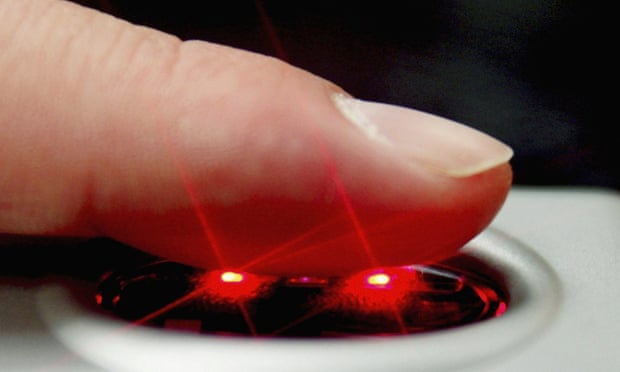Fair Work Commission rejects case by Queensland sawmill worker who said scanning system was a breach of his privacy
Businesses using fingerprint scanners to monitor their workforce can legally sack employees who refuse to hand over biometric information on privacy grounds, the Fair Work Commission has ruled.
The ruling, which will be appealed, was made in the case of Jeremy Lee, a Queensland sawmill worker who refused to comply with a new fingerprint scanning policy introduced at his work in Imbil, north of the Sunshine Coast, late last year.
Fingerprint scanning was used to monitor the clock-on and clock-off times of about 150 sawmill workers at two sites and was preferred to swipe cards because it prevented workers from fraudulently signing in on behalf of their colleagues to mask absences.
The company, Superior Woods, had no privacy policy covering workers and failed to comply with a requirement to properly notify individuals about how and why their data was being collected and used. The biometric data was stored on servers located off-site, in space leased from a third party.
Lee argued the business had never sought its workers’ consent to use fingerprint scanning, and feared his biometric data would be accessed by unknown groups and individuals.
“I am unwilling to consent to have my fingerprints scanned because I regard my biometric data as personal and private,” Lee wrote to his employer last November.
“Information technology companies gather as much information/data on people as they can.
“Whether they admit to it or not. (See Edward Snowden) Such information is used as currency between corporations.”
Lee was neither antagonistic or belligerent in his refusals, according to evidence before the commission. He simply declined to have his fingerprints scanned and continued using a physical sign-in booklet to record his attendance.
He had not missed a shift in more than three years.
The employer warned him about his stance repeatedly, and claimed the fingerprint scanner did not actually record a fingerprint, but rather “a set of data measurements which is processed via an algorithm”. The employer told Lee there was no way the data could be “converted or used as a finger print”, and would only be used to link to his payroll number to his clock-on and clock-off time. It said the fingerprint scanners were also needed for workplace safety, to accurately identify which workers were on site in the event of an accident.
Lee was given a final warning in January, and responded that he valued his job a “great deal” and wanted to find an alternative way to record his attendance.
“I would love to continue to work for Superior Wood as it is a good, reliable place to work,” he wrote to his employer. “However, I do not consent to my biometric data being taken. The reason for writing this letter is to impress upon you that I am in earnest and hope there is a way we can negotiate a satisfactory outcome.”
Lee was sacked in February, and lodged an unfair dismissal claim in the Fair Work Commission.
He argued he was sacked for failing to comply with an unreasonable direction, because the fingerprint scanning was in breach of Australian privacy laws. His biometric information was sent to a separate corporate entity that was not his employer, Lee argued. His employer had no privacy policy in place at the time, and he argued it had failed to issue a privacy collection notice to its employees, as required by law. Lee argued the company had effectively breached the privacy of its 150 workers twice a day, every day since fingerprint scanning was introduced.
But the unfair dismissal claim failed. The Fair Work Commission found the site attendance policy that Lee had breached was lawful. It found that although the company may have breached privacy laws, the site-attendance policy was not automatically rendered unlawful as it related to Lee.
“While there may have been a breach of the Privacy Act relevant to the notice given to employees, the private and sensitive information was not collected and would never be collected relevant to Mr Lee because of his steadfast refusal,” the commission found. “The policy itself is not unlawful, simply the manner in which the employer went about trying to obtain consent may have constituted a breach of the Privacy Act.”
Lee told Guardian Australia he planned to appeal. He said the ruling implied that Australians only owned their biometric data until an employer demanded it, at which point they could be sacked if they refused to consent.
“My biometric data is inherently mine and inseparable from me,” Lee said. “My employer can’t demand it or sack me for refusing to give it.”
“It’s not about this particular employer. Ownership to me means that I can refuse consent without being sacked.”

